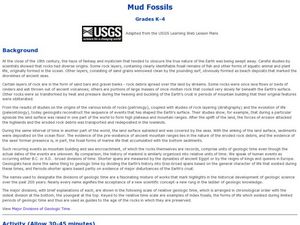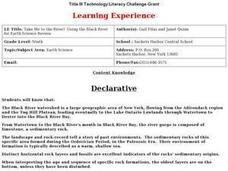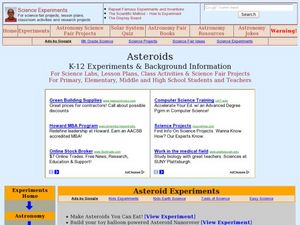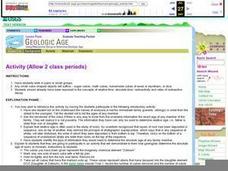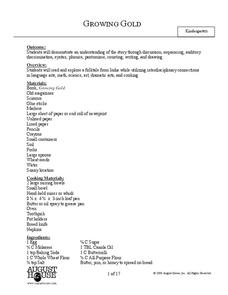Curated OER
Dino Fossils
Primary paleontologists discover the information they can gather from examining fossils. They place pictures in the correct sequence showing how an animal becomes a fossil. They discuss which sediments would preserve fossils better as well.
Curated OER
Excavating the Past
Students discover how palaeontologists conduct a dig for fossils and how they interpret the age of the fossils. In small groups, they prepare a "dig site" consisting of bones, rocks and soil layered in a cardboard box. They switch boxes...
Curated OER
Solid Earth Socratic Questions
Students participate in a whole class discussion to relate what they know about earthquakes to the processes of plate tectonics. They respond to prompts that lead them to conclusions about the layers of the earth.
Curated OER
Water and Ice
Young scholars explore water as it changes states of matter. In this physical property lesson, students use observation, measurement, and communication skills to describe changes in water as it goes from a solid to a liquid and back again.
Curated OER
Mud Fossils
Young scholars observe real fossils. In this science lesson, students make their own mud fossils by pressing material into the mud and letting it dry in the sun for 3-4 days. Young scholars then get the fossils out displaying their mud...
Curated OER
The Formation of Coal
In this coal formation worksheet, students read and informational sheet about coal formation. Students are given 5 short-answer questions regarding what they've read.
Curated OER
Who Was Here First? Relative Dating
Students read about and complete question activities for the topic of relative dating. In this relative dating lesson, students read information for the topic and then complete two activities to further their understanding of geologic...
Curated OER
Take Me to the River! Using the Black River for Earth Science Review
Ninth graders use maps to identify landscape regions and drainage patterns producing the Black River. They create PowerPoint presentations pertaining to the Black River watershed, its geologic history and highlighting safe rafting...
Curated OER
Asteroids
Students examine a potential asteroid impact site. They describe evidence and theories for extinction events.
Curated OER
Using Radioactive Decay to Determine Geologic Age
Students investigae using radioactive decay to determine geologic age.
Curated OER
Examining the Fossil Record
Young scholars create an evolutionary tree based on fossil morphology and their ages. In this fossil record lesson plan, students are given 23 pictures of fossil. They study their morphology and arrange the fossils by age and structures...
Curated OER
Growing Gold
Young scholars read and explore a folktale from India. In this folktale activity, students read the book Growing Gold and discuss the events from the tale. Young scholars complete a phonics worksheet which incorporates the rhyming words...
Curated OER
Geologic Time: Relative and Absolute Dating
High schoolers investigate relative and absolute dating; determine the difference between the two dating systems; and apply this knowledge by creating a geologic timetable of their own.
Curated OER
Composing Your Own Song
In this composing task instructional activity, students read 2 pages of information regarding basic composition, backing rhythms, composing the melodies by ear and from the chord, and composing the chorus. Steps and tips for composing...
Curated OER
Fossil Footsteps
Fourth graders create their own dinosaur tracks using clay. In addition, 4th graders compose a story about the dinosaur / animal who created the tracks. They study photographs of dinosaur tracks before beginning.
Curated OER
Stratigraphy and Cross-Dating
Students interpret archaeological strata using the law of superposition. They apply cross-dating to determine the age of other artifacts.
Science Education Resource Center at Carleton College
Serc: Mn Step: Relative Dating Using "The Block"
This lesson involves an innovative strategy for introducing the concept of relative dating using a block of wood that has been painted, damaged, and nailed. The task for students is to analyze the order in which these events happened and...
Utah Education Network
Uen: Fossil Inferences
Arrange fossil pictures in sequence from oldest to youngest.
Science Education Resource Center at Carleton College
Serc: The Sedimentary Processes of Transgression and Regression
This article gives a detailed explanation of how transgression and regression of sea levels work to create deposits of sedimentary rocks. Illustrations show the layering that takes place over time. The article discusses how geologists...
US Geological Survey
U.s. Geological Survey: Geologic Time
A discussion of geologic time, how scientists use the concept, and how they have determined its span.






